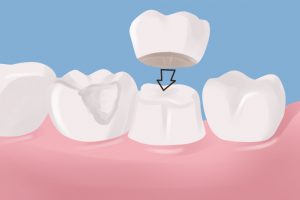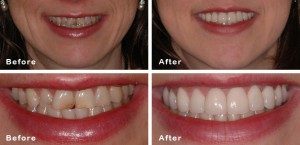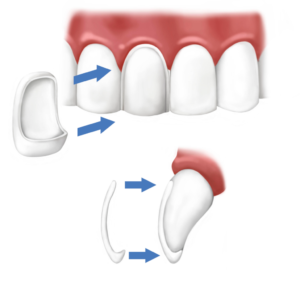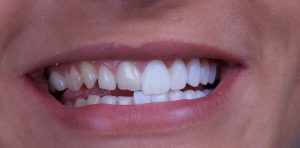Crowns
A crown is a tooth-shaped cap that is placed over the entire visible portion of your tooth. It’s a permanent solution for a damaged or discoloured tooth and once it’s fixed in place, a crown will look, feel and function just like any other tooth.
Crowns are usually needed if you have a damaged or weakened tooth that cannot be fixed with a filling. Sometimes crowns are needed because of aesthetic considerations but mainly it’s due to a lack of remaining tooth structure. Most commonly this is because a tooth has had a large filling or has sustained a fracture.
Depending on where in your mouth a crown is being fitted, they can be made from either metal, or metal covered in porcelain, or completely from porcelain, Zirconia crowns can also be constructed . Porcelain and Zirconia crowns are used when the treatment is being carried out on a tooth that’s towards the front of your mouth, so it’s practically impossible to tell it apart from your natural teeth.
It usually takes two appointments to prepare and fit a crown. During the first visit, your dentist will remove any weakened parts of the tooth and prepare it so it’s equipped to hold the crown. Your dentist will then take an impression and fit a temporary crown, the colour for the new crown will be selected to match the colour of your natural teeth.
At your next appointment your dentist will ensure the fit is correct by checking that you bite correctly with the crown in place, and that you are happy with the colour and appearance, they will then use special cements to fix it permanently in place.
How should I look after my crown?
You can treat your crown like a normal tooth. While it does not require any particular care, remember that it acts as a sleeve over the top of your natural tooth and so decay and gum disease can still occur without a good oral health routine. Regular dental examinations are important so any oral health issues can be picked up early and it is important to use dental floss around the tooth. When flossing, try to pull the floss through your teeth rather than upwards – sometimes pulling up and out can catch on your crown and contribute to wear and tear. Your dentist will demonstrate the best way to floss and care for your new crown.
Veneers
A veneer is a thin moulding, custom-made from porcelain, which is bonded to the front surface of a tooth. Veneers are a quick and effective solution to stained, chipped, misshapen or crooked teeth. They can also be used to cover gaps in teeth where orthodontic treatment may not be suitable.
Veneers are a cosmetic treatment. They cover only the front surface of the tooth and will mimic the size, shape and colour of your teeth, creating a very natural look. A precise shade of porcelain can be chosen to give the right colour to improve a single discoloured tooth or to lighten your front teeth.
Veneers provide a very natural finish. If you are concerned about misshapen, chipped or discoloured teeth, veneers can offer a long-lasting cosmetic solution.
The colour of the porcelain veneer can be selected to match your existing teeth or to make them appear whiter. The porcelain finish also mimics the light-reflecting qualities of natural teeth, helping you achieve a brighter, natural -looking smile.
Porcelain veneers are also more stain resistant and durable than composite bonding, and if looked after properly, can last for many years.
Veneers offer a gentler approach to altering a tooth’s shape or colour than crowns, as only a small amount of enamel has to be removed to fit the veneer. Yet they offer similar strength and very natural looking results.
It usually takes two appointments to prepare and fit a veneer. During the first visit, your dentist will prepare the tooth so it’s equipped to hold the veneer. Your dentist will then take an impression, the colour for the new veneer will be selected to match the colour of your natural teeth.
At your next appointment your dentist will ensure the fit is correct by checking that you bite correctly with the veneer in place, and that you are happy with the colour and appearance, they will then use special adhesives to fix it permanently in place.
You can treat your dental veneers as you would your own teeth, by brushing with a non-abrasive toothpaste and flossing twice a day, to prevent your new veneers from discolouring and staining try to avoid foods and drink that stain such as black coffee.



